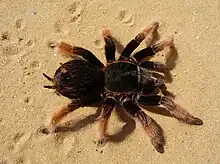Theraphosoidina
Theraphosoidina is a clade of avicularioid mygalomorph spiders first proposed by Robert J. Raven in 1985, based on a morphological cladistic analysis. Raven included three families: Theraphosidae, Paratropididae and Barychelidae.[1] Subsequent molecular phylogenetic studies upheld the relationship between the Theraphosidae and Barychelidae, but found that Paratropidae fell outside the clade.[2][3][4][5]
| Theraphosoidina | |
|---|---|
 | |
| Brachypelma klaasi, a member of the Theraphosidae | |
| Scientific classification | |
| Domain: | Eukaryota |
| Kingdom: | Animalia |
| Phylum: | Arthropoda |
| Subphylum: | Chelicerata |
| Class: | Arachnida |
| Order: | Araneae |
| Infraorder: | Mygalomorphae |
| Clade: | Crassitarsae |
| Clade: | Theraphosoidina Raven, 1985 (as a "micropicoorder") |
| Families | |
Taxonomy
Theraphosoidina was first proposed as a taxon by Robert J. Raven in 1985, based on a morphological cladistic analysis. Raven included three families: Theraphosidae, Paratropididae and Barychelidae. The group was characterized by the similar conformation of the male tibial spur (used in mating), reduced toothing of the paired claws and many labial cuspules.[1]
Subsequent molecular phylogenetic studies upheld the relationship between the Theraphosidae and Barychelidae, but found that Paratropidae fell outside the clade.[2][3] In 2012, it was suggested that Theraphosoidina should probably include an additional family of spiders related to Homostola.[4] A major 2020 study of the Mygalomorphae established the new family Bemmeridae (raised from the rank of tribe) containing the two genera Homostola and Spiroctenus and included it within Theraphosoidina.[5]
Phylogeny
An outline version of the preferred cladogram from a 2020 phylogenetic study of the Mygalomorphae is shown below. (A node with lower support is marked ♦.) Although the precise position of the Theraphosoidina clade varied in some of the individual analyses, the clade itself was well supported.[5]
| Avicularioidea |
| ||||||||||||||||||||||||||||||||||||
Families
According to Opatova et al. (2020), the clade includes the following families, one of which (Bemmeridae) was first described at this rank in their study:[5]
References
- Raven, Robert J. (1985), "The spider infraorder Mygalomorphae (Araneae) : cladistics and systematics", Bulletin of the AMNH, 182, hdl:2246/955, retrieved 2016-01-18
- Hedin, Marshal & Bond, Jason E. (2006), "Molecular phylogenetics of the spider infraorder Mygalomorphae using nuclear rRNA genes (18S and 28S): Conflict and agreement with the current system of classification", Molecular Phylogenetics and Evolution, 41 (2): 454–471, doi:10.1016/j.ympev.2006.05.017, PMID 16815045
- Garrison, Nicole L.; Rodriguez, Juanita; Agnarsson, Ingi; Coddington, Jonathan A.; Griswold, Charles E.; Hamilton, Christopher A.; Hedin, Marshal; Kocot, Kevin M.; Ledford, Joel M. & Bond, Jason E. (2016), "Spider phylogenomics: untangling the Spider Tree of Life", PeerJ, 4: e1719, doi:10.7717/peerj.1719, PMC 4768681, PMID 26925338
- Bond, Jason E.; Hendrixson, Brent E.; Hamilton, Chris A. & Hedin, Marshal (2012), "A Reconsideration of the Classification of the Spider Infraorder Mygalomorphae (Arachnida: Araneae) Based on Three Nuclear Genes and Morphology", PLOS ONE, 7 (6): e38753, doi:10.1371/journal.pone.0038753, PMC 3378619, PMID 22723885
- Opatova, Vera; Hamilton, Chris A.; Hedin, Marshal; Montes De Oca, Lauren; Král, Jiři; Bond, Jason E. (2019), "Phylogenetic Systematics and Evolution of the Spider Infraorder Mygalomorphae Using Genomic Scale Data", Systematic Biology, 69 (4): 671–707, doi:10.1093/sysbio/syz064, PMID 31841157